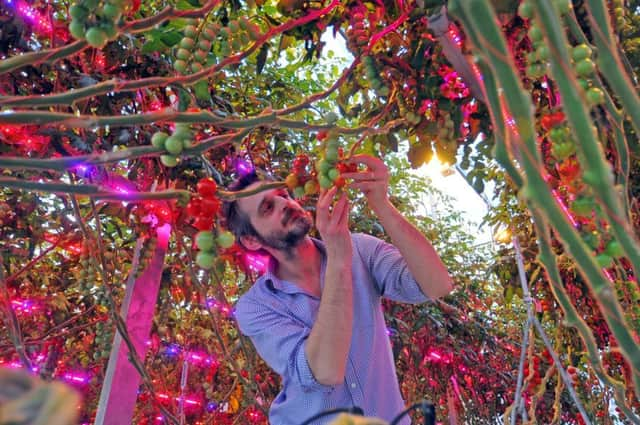The big bang on Yorkshire's farms is the biggest revolution since the tractor


But this network of greenhouses, in which they’re propagating tomatoes next to giant tubes, is at the centre of an agricultural “big bang” that is predicted to change Yorkshire’s agricultural sector as profoundly as the tractor and the combine harvester a century ago.
The unveiling on Wednesday by the Business Secretary, Greg Clark, of a £90m fund to help farmers and growers embrace new technology has turned the industry’s focus to the work going on in a cluster of centres within North Yorkshire – an area Mr Clark now says is one of the nation’s leading “agri-food tech hubs”.
Advertisement
Hide AdAdvertisement
Hide AdHe told The Yorkshire Post: “Yorkshire’s track record of innovation, together with the region’s strengths in livestock, arable farming and its innovative agri-food industry, means the region is perfectly placed to drive agricultural innovation.”
Yet the country is less far ahead than it might have been, were it not for the economic policies of a previous Conservative administration, an expert in the field said last night.
It was Margaret Thatcher who, towards the end of her administration, cut funding for “agricultural extension”, a practice which helps speed new techniques from the lab to the land.
Dr David George, director of science at the Stockbridge Technology Centre on the outskirts of Cawood near Selby, said: “Almost definitely, had we maintained an extension service, we would be further ahead.
Advertisement
Hide AdAdvertisement
Hide Ad“We never really got that back – unlike other places in Europe.”
Stockbridge is one of the centres at the coal face of a revolution Dr George called the “big bang of knowledge”, which is now resonating across the farming community.
It is already seeing science-fiction concepts like driverless tractors steered by satellites, and the examination of crops by photographic drone, turned into reality.
“I think we are very much on the on the verge of another agricultural revolution, and it’s being driven by innovations in technology – precision agriculture that will allow us to grow multiple crops together and grow produce in a more sustainable way,” Dr George said.
Advertisement
Hide AdAdvertisement
Hide AdHis current developments include the growing of tomatoes under LED lights to enable their production in winter – saving energy and reducing reliance on imports.
The injection of new funds would also help increase the yields growers can expect from their land, following years in which levels have plateaued, Dr George said.
But it would also mean that farmers of the future would need different skills, he warned.
“You’re going to be seeing farmers engaging much more with technology. Agricultural colleges will be teaching different skills. There will be a much bigger emphasis on public services for the public good, like carbon capture from soils and the protection of farmland beyond the crop field.”
Advertisement
Hide AdAdvertisement
Hide AdNew money would also help bridge what food scientists call the “valley of death” – the time taken to develop ideas, he said.
“At the moment there is a lag time of something like 10 to 15 years from very good ideas being generated in universities to actually being used on the farm, and that’s far too long.
“We need to shorten that lag time significantly and certainly injections of money into agri-tech centres will help right along.”
The Centre for Crop Health and Protection at Sand Hutton, east of York, which has a team working at Stockbridge, said the cash for “a new agri-tech revolution” was “great news”.
Advertisement
Hide AdAdvertisement
Hide AdIts chief executive, Fraser Black, said: “It’s all about improving productivity using innovative technology and the best scientific expertise, and changing the way we farm for ever.”
Its projects include a national surveillance and forecasting service to understand the risk from crop pests, and mobile trailers that can instantly diagnose crop fungus and other conditions.
It is also building a £4m edge-of-field water assessment facility to allow environmental testing of plant protection products.